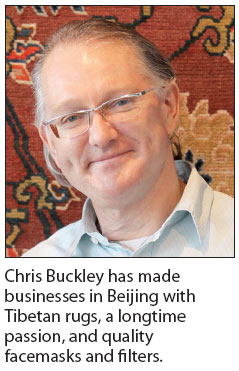Breathing in Beijing
Updated: 2011-12-19 11:00
By Angela Shen (China Daily)
|
|||||||||
Air pollution in China's big cities gets lot of attention, but one British entrepreneur says the challenge can be faced, Angela Shen reports.
Running from a problem does nothing to solve it - especially one as difficult and pervasive as air pollution. Chris Buckley, a British expatriate, felt the touch of pollution on his health soon after he moved to Beijing in 2000, where he developed mild asthma. Despite this, however, he never considered leaving Beijing to be an option.
"My life and job are here," says Buckley, referring to the two stores that he owns in Shunyi district of Beijing. "So, like everyone here in Beijing, [I had] to adapt and get on with life."
Buckley says he had wanted to come to China for a long time, but initially got a posting to Japan.
"When the chance came up to come here, I took it."

Later, he swapped his research and development job at P&G to open a shop for Tibetan art and rugs.
"My interest in 'things Tibetan' goes back a long way - I first visited the area in 1996 and liked the art and handicrafts immediately. I collected old Tibetan rugs for a while and then met a Tibetan workshop manager, Norbu Tsering, and founded the Tibet Tanva Weaving Workshop with him."
Buckley had a long interest in design that fit well with rug-making. "Our business is in new Tibetan rugs that we make at our own workshop," but he also sells other kinds of weavings made by Tibetan artisans, including Wangden meditation rugs, traditional aprons and yak-hair blankets.
Happy with his Tibetan rug business, Buckley says he had to do more than just try to cope with his asthma. He did extensive research on remediating air pollution, and became convinced that good air purifiers would make life easier not just for him but for expats making the transition to Beijing.
As a longtime scientist, Buckley says, he liked doing product research, so he didn't find the process of trying different models of air purifiers to be tedious.
So, even before his research into air pollution and air filters, Buckley was familiar with using and operating air filters. The hardest part of the research, he says, was measuring the amount of air pollution.
Blueair, a Swedish product that Buckley had shipped over from England, was the fifth model he had tested during his trial-and-error research. He says the machine works quickly, efficiently and quietly. The last factor would be critical to homeowners who want to keep it on at night and still get a good night's sleep.
"I use to wake up in the middle of the night, finding myself unable to breathe, which scared my wife," says Buckley, whose asthma had been much more active before his installation of Blueair in his bedroom.
While Buckley says a top-quality filter such as Blueair is good for children and people with respiratory problems, it is not a perfect answer.
In Beijing, unless you live like a hermit (without ever opening any windows or doors), no matter how much you clean there will always be a thin layer of dust on the table the next day.
"I am optimistic about the future of Beijing air, Buckley says, despite resorting to what some see as drastic measures. "It took Western cities - for example, Los Angeles - decades to solve air-pollution problems, so expecting Beijing to fix its issues overnight is unrealistic.
"Another point to bear in mind is that some of the improvements in air quality in the US and Europe have come from shutting down traditional industries (such as iron- and steel-making) and importing these goods from Asia instead. China has become the manufacturing workshop of the world, so it has a far more difficult job to control air pollution than the US or the average European country."
One consequence of this, he says, is that "there is sure to be a market for air purifiers here for some time to come."
Buckley says air pollution in the capital decreased in 2009 due to the "big push to improve air quality" during the Olympics, and the temporary closure of many industries and factories during the financial crisis later. However, with many people buying more cars, air pollution has returned to the level it was at in 2005 and 2006, he says.
Longterm solutions - top-of-the-line scrubbers for coal plants, replacing coal with nuclear power - are both costly and controversial.
Ultimately, however, it is the government and the people's decision. It is the government, he says, that "needs to find a balance between people's desire for economic growth and healthcare."
"My job is not really to educate people about pollution," says Buckley, though he will try to make the information about air pollution on his website more readily available to non-English speakers in the future. "My job is to answer the needs [of] people who already know about air pollution."
Most of his customers are foreigners, especially families with kids.
"The biggest thing you can do for your health here is to put an air purifier in your bedroom. After that, the next priority is to put air purifiers in living rooms and offices. We also sell N95-rated face masks for very high pollution days and for those who like to walk, cycle or get other outdoor exercise in the city."











